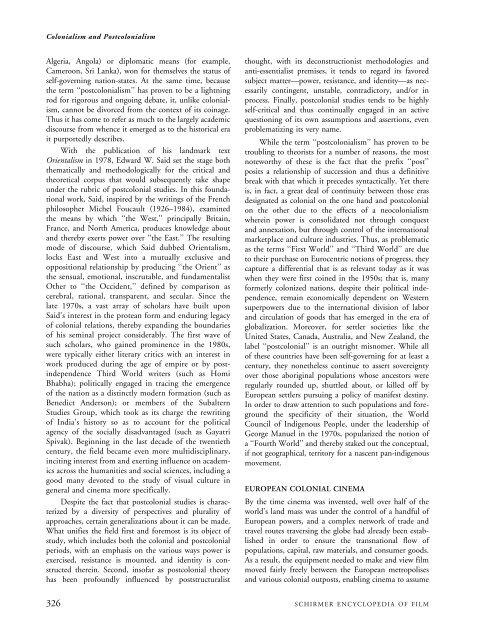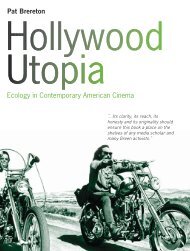Schirmer Encyclopedia of Film
Schirmer Encyclopedia of Film
Schirmer Encyclopedia of Film
Create successful ePaper yourself
Turn your PDF publications into a flip-book with our unique Google optimized e-Paper software.
Colonialism and Postcolonialism<br />
Algeria, Angola) or diplomatic means (for example,<br />
Cameroon, Sri Lanka), won for themselves the status <strong>of</strong><br />
self-governing nation-states. At the same time, because<br />
the term ‘‘postcolonialism’’ has proven to be a lightning<br />
rod for rigorous and ongoing debate, it, unlike colonialism,<br />
cannot be divorced from the context <strong>of</strong> its coinage.<br />
Thus it has come to refer as much to the largely academic<br />
discourse from whence it emerged as to the historical era<br />
it purportedly describes.<br />
With the publication <strong>of</strong> his landmark text<br />
Orientalism in 1978, Edward W. Said set the stage both<br />
thematically and methodologically for the critical and<br />
theoretical corpus that would subsequently take shape<br />
under the rubric <strong>of</strong> postcolonial studies. In this foundational<br />
work, Said, inspired by the writings <strong>of</strong> the French<br />
philosopher Michel Foucault (1926–1984), examined<br />
the means by which ‘‘the West,’’ principally Britain,<br />
France, and North America, produces knowledge about<br />
and thereby exerts power over ‘‘the East.’’ The resulting<br />
mode <strong>of</strong> discourse, which Said dubbed Orientalism,<br />
locks East and West into a mutually exclusive and<br />
oppositional relationship by producing ‘‘the Orient’’ as<br />
the sensual, emotional, inscrutable, and fundamentalist<br />
Other to ‘‘the Occident,’’ defined by comparison as<br />
cerebral, rational, transparent, and secular. Since the<br />
late 1970s, a vast array <strong>of</strong> scholars have built upon<br />
Said’s interest in the protean form and enduring legacy<br />
<strong>of</strong> colonial relations, thereby expanding the boundaries<br />
<strong>of</strong> his seminal project considerably. The first wave <strong>of</strong><br />
such scholars, who gained prominence in the 1980s,<br />
were typically either literary critics with an interest in<br />
work produced during the age <strong>of</strong> empire or by postindependence<br />
Third World writers (such as Homi<br />
Bhabha); politically engaged in tracing the emergence<br />
<strong>of</strong> the nation as a distinctly modern formation (such as<br />
Benedict Anderson); or members <strong>of</strong> the Subaltern<br />
Studies Group, which took as its charge the rewriting<br />
<strong>of</strong> India’s history so as to account for the political<br />
agency <strong>of</strong> the socially disadvantaged (such as Gayatri<br />
Spivak). Beginning in the last decade <strong>of</strong> the twentieth<br />
century, the field became even more multidisciplinary,<br />
inciting interest from and exerting influence on academics<br />
across the humanities and social sciences, including a<br />
good many devoted to the study <strong>of</strong> visual culture in<br />
general and cinema more specifically.<br />
Despite the fact that postcolonial studies is characterized<br />
by a diversity <strong>of</strong> perspectives and plurality <strong>of</strong><br />
approaches, certain generalizations about it can be made.<br />
What unifies the field first and foremost is its object <strong>of</strong><br />
study, which includes both the colonial and postcolonial<br />
periods, with an emphasis on the various ways power is<br />
exercised, resistance is mounted, and identity is constructed<br />
therein. Second, ins<strong>of</strong>ar as postcolonial theory<br />
has been pr<strong>of</strong>oundly influenced by poststructuralist<br />
thought, with its deconstructionist methodologies and<br />
anti-essentialist premises, it tends to regard its favored<br />
subject matter—power, resistance, and identity—as necessarily<br />
contingent, unstable, contradictory, and/or in<br />
process. Finally, postcolonial studies tends to be highly<br />
self-critical and thus continually engaged in an active<br />
questioning <strong>of</strong> its own assumptions and assertions, even<br />
problematizing its very name.<br />
While the term ‘‘postcolonialism’’ has proven to be<br />
troubling to theorists for a number <strong>of</strong> reasons, the most<br />
noteworthy <strong>of</strong> these is the fact that the prefix ‘‘post’’<br />
posits a relationship <strong>of</strong> succession and thus a definitive<br />
break with that which it precedes syntactically. Yet there<br />
is, in fact, a great deal <strong>of</strong> continuity between those eras<br />
designated as colonial on the one hand and postcolonial<br />
on the other due to the effects <strong>of</strong> a neocolonialism<br />
wherein power is consolidated not through conquest<br />
and annexation, but through control <strong>of</strong> the international<br />
marketplace and culture industries. Thus, as problematic<br />
as the terms ‘‘First World’’ and ‘‘Third World’’ are due<br />
to their purchase on Eurocentric notions <strong>of</strong> progress, they<br />
capture a differential that is as relevant today as it was<br />
when they were first coined in the 1950s; that is, many<br />
formerly colonized nations, despite their political independence,<br />
remain economically dependent on Western<br />
superpowers due to the international division <strong>of</strong> labor<br />
and circulation <strong>of</strong> goods that has emerged in the era <strong>of</strong><br />
globalization. Moreover, for settler societies like the<br />
United States, Canada, Australia, and New Zealand, the<br />
label ‘‘postcolonial’’ is an outright misnomer. While all<br />
<strong>of</strong> these countries have been self-governing for at least a<br />
century, they nonetheless continue to assert sovereignty<br />
over those aboriginal populations whose ancestors were<br />
regularly rounded up, shuttled about, or killed <strong>of</strong>f by<br />
European settlers pursuing a policy <strong>of</strong> manifest destiny.<br />
In order to draw attention to such populations and foreground<br />
the specificity <strong>of</strong> their situation, the World<br />
Council <strong>of</strong> Indigenous People, under the leadership <strong>of</strong><br />
George Manuel in the 1970s, popularized the notion <strong>of</strong><br />
a ‘‘Fourth World’’ and thereby staked out the conceptual,<br />
if not geographical, territory for a nascent pan-indigenous<br />
movement.<br />
EUROPEAN COLONIAL CINEMA<br />
By the time cinema was invented, well over half <strong>of</strong> the<br />
world’s land mass was under the control <strong>of</strong> a handful <strong>of</strong><br />
European powers, and a complex network <strong>of</strong> trade and<br />
travel routes traversing the globe had already been established<br />
in order to ensure the transnational flow <strong>of</strong><br />
populations, capital, raw materials, and consumer goods.<br />
As a result, the equipment needed to make and view film<br />
moved fairly freely between the European metropolises<br />
and various colonial outposts, enabling cinema to assume<br />
326 SCHIRMER ENCYCLOPEDIA OF FILM
















